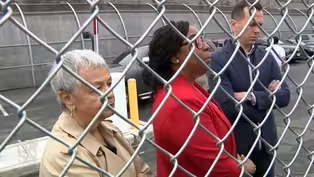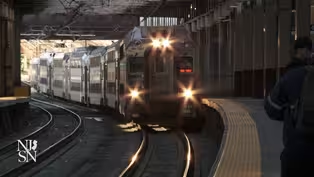NJ Spotlight News
Air traffic controllers working with ‘World War II technology’
Clip: 5/20/2025 | 7m 30sVideo has Closed Captions
Interview: Randy Babbitt, former FAA administrator
Newark Liberty International Airport on Monday experienced its fourth communications outage in less than a month. The Federal Aviation Administration says this latest outage lasted for two seconds at the Philadelphia air traffic control center, also known as TRACON, that handles flights into and out of Newark. The agency, which is investigating the latest outage, insists the system remains safe.
Problems playing video? | Closed Captioning Feedback
Problems playing video? | Closed Captioning Feedback
NJ Spotlight News is a local public television program presented by THIRTEEN PBS
NJ Spotlight News
Air traffic controllers working with ‘World War II technology’
Clip: 5/20/2025 | 7m 30sVideo has Closed Captions
Newark Liberty International Airport on Monday experienced its fourth communications outage in less than a month. The Federal Aviation Administration says this latest outage lasted for two seconds at the Philadelphia air traffic control center, also known as TRACON, that handles flights into and out of Newark. The agency, which is investigating the latest outage, insists the system remains safe.
Problems playing video? | Closed Captioning Feedback
How to Watch NJ Spotlight News
NJ Spotlight News is available to stream on pbs.org and the free PBS App, available on iPhone, Apple TV, Android TV, Android smartphones, Amazon Fire TV, Amazon Fire Tablet, Roku, Samsung Smart TV, and Vizio.
Providing Support for PBS.org
Learn Moreabout PBS online sponsorshipWhile much of the state's attention may have shifted to the troubles at New Jersey Transit.
But another major transportation problem here is far from over.
Newark Airport on Monday experienced its fourth communications outage in less than a month.
The FAA says this latest one lasted for 2 seconds, that the Philadelphia air traffic control Center, also known as TRACON, that handles flights in and out of Newark.
The agency is investigating and insists the system remains safe.
But recent equipment failures, staffing shortages and aging infrastructure have raised questions about just how true that is.
To help us understand what's happening behind the scenes, we're joined by Randy Babbitt, former FAA administrator from 2009 to 2011.
Randy, good to talk to you.
Really looking to get some insight here, as I think many folks are.
Obviously, there was a fourth system outage now at Newark Airport in just the last month.
A lot has been made and a lot of our federal lawmakers here have been making a point to call out.
That TRACON, which is the radar control facility, was moved from Long Island to Philadelphia.
How much of a factor is that in some of the problems that we're seeing play out?
Well, first, it's good to be here.
Thank you.
But with regard to the question, that shouldn't really make much difference.
And in this day and age, they were moving to gather up a more modern structure and set of equipment.
And and they do that.
They have consolidated.
There was a point in time when, you know, every airport had its own approach control and that's not efficient.
So this is part of years back moves for efficiency.
Why then are we really only seeing these system outages play out at Newark Airport?
Well, it you know, it's a big airport, a busy airport.
And if you have a failure there, everybody knows about it.
If the airport at Athens, Georgia, goes out, nobody knows about it.
So it's just the volume that goes through that airport.
And it's one of the busiest traffic areas in the world.
I know you were with the FAA and saw through a time of technology upgrades.
So what's the reality of doing the type of upgrades that the FAA currently says are needed in a system that is in the busiest airspace in the country?
Yeah, And it it should be a priority.
You know, when, of course, we go through the age old argument of the bottom line is who's in charge.
And so they blame the FAA.
But does the FAA make these decisions uninhibited?
No.
The secretary of transportation or the Department of Transportation has to go along.
Can they do that unilaterally?
No.
Congressional funding has to happen.
And so there's a lot of people that are going to have to get lined up on the same page to bring about an efficient and proper solution, including the electronics, the staffing, the manning of different facilities all go into the mix.
How big a role do something?
Does something like the staffing issue, for example?
A lot of ideas have been floated around about, you know, how to address that and incentives, pipelines and the like.
But how big of a role does that staffing shortage play in contributing to some of the issues we're seeing?
Well, I think it contributes to significantly the problem that the FAA has currently stems all the way back to COVID.
You know, when you take the air traffic control system and operated at 30% of its capacity, you have way too many people and so did airlines and so do a lot of other places.
And so you lay people off.
But the problem is you don't just call them back a week later to take a new hire somewhere more than two years to put them on the line.
And that's in a simple facility.
I'm sure that you saw that press conference that Secretary Duffy had where he was holding those floppy disks and they were making much about some of the technology.
How accurate is that with what folks are really working with on a day to day?
I mean, I know here in New Jersey, our government systems technology wise, have been pretty outdated.
They've been going through the process of that.
So, you know, for many folks, it wouldn't necessarily surprise them.
But are they really working with that antiquated of equipment?
Yes, we are.
I gave a tour just before I became the secretary, and the secretary of transportation went with me.
And he was fascinated by this.
You know, all these screens and and I'm looking at it knowing full well this is World War two technology.
And he was, oh, this is so modern and this is so cool.
And I said, Mr. Secretary, when was the last time you saw the word UNIVAC written on something?
I mean, that's how old some of this stuff is in vacuum tubes.
And, you know, it's been a long process.
And, you know, you've got nine sections of the country.
You dial nine different regions of air traffic control.
And unfortunately, they're not as coordinated and unified in their equipage as they should be.
So one sector will say, well, you know, we've got enough money, we're going to redo the Miami Center.
And another sector might not have the same funding.
Yeah.
It's really yeah, it could be consolidated.
I mean, if you you wouldn't run a company this way, you know, and and I came from the private sector.
Given the fact that a lot of folks have said these problems have been building.
Does it surprise you then to see what is happening in the air space?
No, it's a little disappointing.
You know, everybody, you know, wants to do things for less and more efficient until they go wrong and then you go, well, we should have got that much.
And I think the FAA has suffered from some of that.
There has been long delays in the reauthorizations and the funding, lack of recognition of of staying modern.
I mean, a system like this, you don't just build it in poor country and say it's going to work for ten years.
You know, it's an ever evolutionary system of technology and it also doesn't work by itself.
Remember that the airplanes that are involved also have to have equipment is compatible with what the FAA has.
So that and you draw the line a lot of the smaller, you know, particularly private aircraft, some of the equipment that would be desired is very, very expensive.
And so they have a policy now, best equipped, best served.
If you don't have this equipment on your airport, you can't excuse me and your airplane.
You can't go to certain airplanes and land.
These airports won't take you without, you know, the modern equipment that helps in an era of traffic separation and control.
Big investment for sure.
Randy Babbitt, thank you so much for your time.
You're sure?
Welcome.
Thank you.
DEP leader testifies in landmark ‘forever chemical’ trial
Video has Closed Captions
Clip: 5/20/2025 | 6m 18s | DuPont, Chemours sued by state over PFAS pollution at Salem County site (6m 18s)
McIver says she won't be intimidated by assault charges
Video has Closed Captions
Clip: 5/20/2025 | 4m 44s | ‘It's political intimidation and I will not be intimidated,’ NJ congresswoman says (4m 44s)
NJ Transit trains back on track for regular rush
Video has Closed Captions
Clip: 5/20/2025 | 4m 19s | Agency CEO says wage increase for rail engineers will not impact fares or taxes (4m 19s)
Providing Support for PBS.org
Learn Moreabout PBS online sponsorshipSupport for PBS provided by:
NJ Spotlight News is a local public television program presented by THIRTEEN PBS














